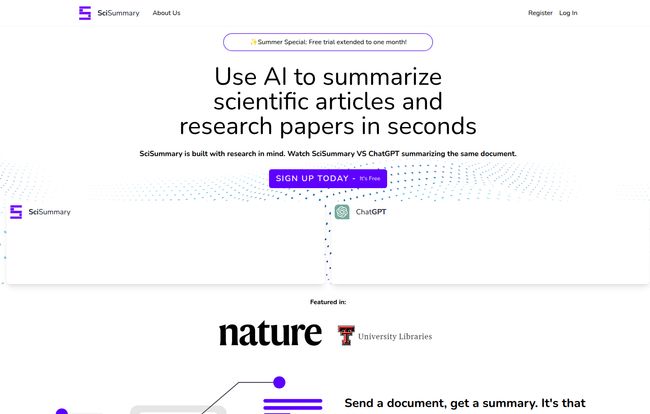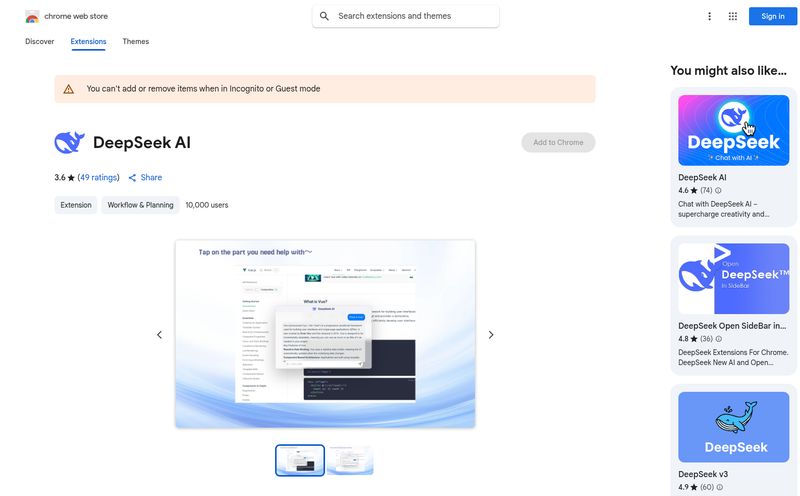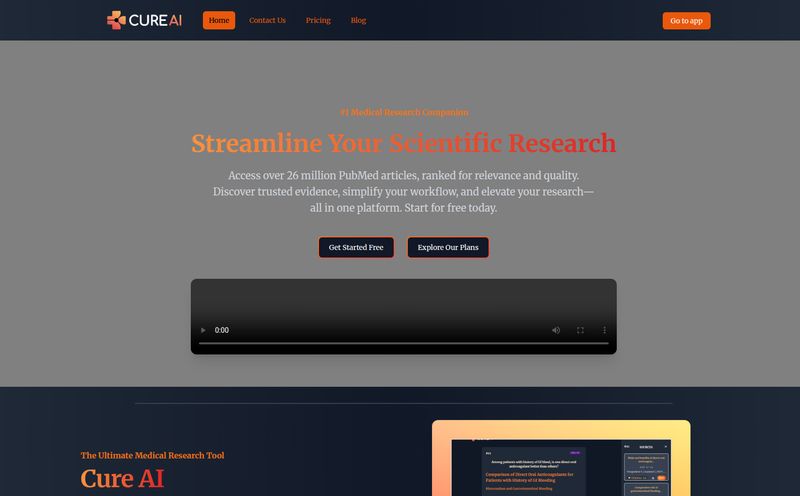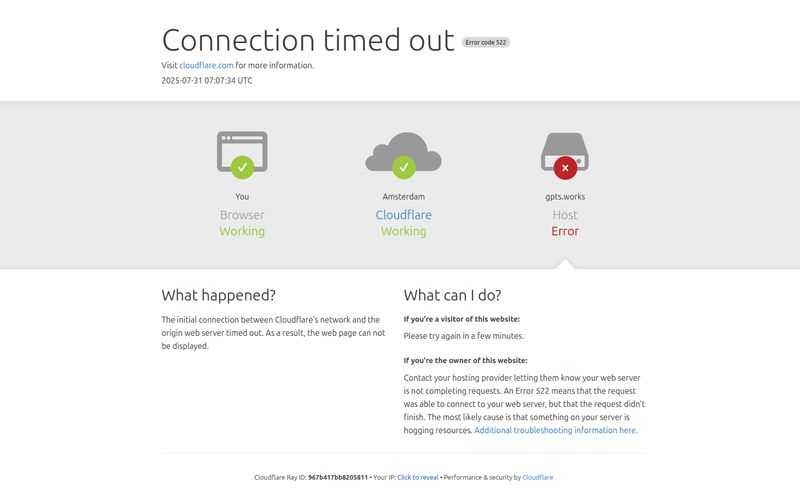If you’re in academia, research, or even just a deeply curious person, you know the feeling. The Everest-sized pile of PDFs. The dozens of browser tabs, each holding a dense, jargon-filled paper that’s probably important. You tell yourself you’ll get to it. This weekend. For sure.
I’ve been there. More times than I can count. During my own stints in higher-ed and now as I try to stay on top of trends for my work, the information firehose is relentless. You spend more time finding the right information than actually using it. It’s a grind. So when a tool pops up claiming it can act like “GPT with a PhD,” my ears perk up. But my skepticism meter goes way up too.
The tool in question is SciSummary. It promises to use AI to summarize scientific articles and research papers in seconds. Not just a simple summary, but a deep, insightful one. I had to see for myself if it was just another AI gimmick or a genuinely useful tool for overwhelmed researchers and students. So, I took it for a spin.

Visit SciSummary
So, What is SciSummary Anyway?
At its core, SciSummary is exactly what it sounds like: a science summary tool. But that's a bit of an understatement. It’s designed to be a research partner. You can feed it a link, a wall of text, or upload a PDF, and within minutes, it emails you a detailed breakdown of the paper. Simple as that.
But the hook that got me, their whole marketing angle, is that this isn't just your standard off-the-shelf language model. They claim their tech is a special blend of the latest LLMs, fine-tuned specifically for scientific literature. The secret sauce? A team of actual PhDs who guide the AI’s training. It's like instead of just reading the entire internet, the AI was forced to go to grad school. The idea is to get summaries that understand the context, the methodology, and the implications, not just rephrase the abstract.
Getting Started: The First Impressions
The signup process is straightforward. They have a free trial, which I always appreciate. Nothing worse than having to pull out your credit card just to see if a tool is even remotely what you need.
The user interface is clean. Minimalist, even. There’s no clutter, no confusing menus. The main dashboard basically screams, “Give me a document!” You have a clear path: upload your file, paste your text, or drop a link. I started with a recent, fairly dense paper on algorithmic bias in search engines. I dropped the PDF link, went to make a coffee, and by the time I sat back down, a summary was waiting in my inbox. Fast. Impressively fast.
The Standout Features That Actually Matter
Okay, so it's fast. But is it good? Let’s get into the nitty-gritty of what this tool can really do, because a few of its features genuinely surprised me.
More Than Just a Summarizer
The first thing to note is the scale. It can handle documents up to 200,000 words. That's not a paper; that's a dissertation. Or a small book. For anyone doing a major literature review or trying to get up to speed in a new field, this is a massive time-saver. The ability to do bulk summaries is another little gem. You can throw a whole folder of papers at it and get a set of summaries to work through. It turns the daunting task of pre-reading into a manageable afternoon activity.
Making Sense of Data with Figure and Table Analysis
Now this... this is the feature that made me sit up and pay attention. Most summarizers are text-only. They see a chart or a graph, and their brain just shorts out. They completely ignore it. SciSummary's AI actually analyzes figures and tables. It will describe the data, explain what the axes represent, and summarize the key takeaway from the visual. For papers in the hard sciences or economics, where the data visualizations are often the entire point, this is a game-changer. It’s one of the clearest indicators that this tool was built by people who actually do research.
Your AI-Powered Research Assistant
Beyond summarizing, SciSummary is trying to be a lightweight research hub. It includes a reference and document manager, so you can import your library and have everything in one place. You can search across all the documents you've uploaded using semantic search, which means you can ask questions like "what papers mention non-parametric methods?" instead of just searching for a keyword. It’s a neat touch that pushes it from a single-task tool into more of a workflow platform.
SciSummary vs. The Usual Suspects (Like ChatGPT)
"Can't I just use ChatGPT for this?" It's a fair question. And yes, you can paste an abstract into a generic AI chatbot and get a summary. But in my experience, it's a gamble. Sometimes it's okay, other times it completely misses the point or, worse, confidently makes stuff up—what the community calls 'hallucinations'.
The difference here is the specialization. Because SciSummary's models are trained and guided by PhDs on scientific text, the output feels more grounded. It's better at picking up the specific structure of a research paper: the introduction, methods, results, and discussion. It’s less likely to get tripped up by specific terminology. I'd trust it far more for a detailed literature review than a general-purpose AI. It's the difference between a Swiss Army knife and a scalpel. Both cut, but you know which one you want for surgery.
Let's Talk Money: The SciSummary Pricing Tiers
Alright, the all-important question: what's this going to cost? SciSummary has a pretty flexible pricing structure, which seems designed to fit different needs. I've broken it down into a simple table.
| Plan | Price | Key Features |
|---|---|---|
| Free Trial | $0 for the first 7 days | 30,000 words summarized, 5 Figure/Table analyses, 100 Chat Messages. |
| Student | $0 for the first month (with code) | Unlimited Summaries, up to 200k words, 5 figure/table analyses, Unlimited Chat. |
| Unlimited Summaries | $6.99/month or $49.99/year | Unlimited everything, plus 1,000 docs for semantic search. |
My take? The pricing is very reasonable. The annual plan for unlimited summaries breaks down to just over $4 a month. (And let's be real, in the world of academic software that can cost hundreds or thousands, that's a steal.) For a grad student or a full-time researcher, the amount of time this could save is easily worth the cost of a couple of coffees.
The Good, The Not-So-Good, and The AI
No tool is perfect. Let's get balanced. The biggest pro is the massive time savings. It lets you triage papers with ruthless efficiency. The figure and table analysis is a close second, a truly killer feature. And the specialized AI model does seem to produce more reliable, context-aware summaries than general tools.
On the flip side, you're still relying on an AI. It's not a human expert. Will it sometimes miss a subtle nuance or a critical caveat in the discussion section? Probably. You can't just take the summary and run with it without ever looking at the source paper, especialy for mission-critical work. It’s a first-pass tool, an assistant, not a replacement for your own critical thinking. Also, the free trial is a bit limited on word count, which is understandable but means you have to upgrade to really put it through its paces with a big project.
Who Is SciSummary Really For?
So, who should click that 'Sign Up' button? In my opinion, the ideal user falls into a few camps:
- Graduate Students: Especially those starting a dissertation or a big literature review. This tool could literally save you weeks or months of work.
- Professional Researchers & Academics: Anyone who needs to stay current on the latest research in their field (and related fields) but doesn't have time to read 50 papers a week.
- Science Journalists and Policy Makers: People who need to quickly understand the core findings of complex research without getting bogged down in the methodological weeds.
- The Lifelong Learner: If you're just endlessly curious and love reading about science, this makes the academic world much more accessible.
Frequently Asked Questions
How does SciSummary's AI work?
It uses a proprietary mix of Large Language Models (LLMs) that have been specifically trained on scientific papers. A team of PhDs reviews and guides the training to help the AI better understand the structure and nuances of academic writing.
Is SciSummary free to use?
There is a 7-day free trial with some limitations. For unlimited use, you'll need one of their paid plans. They also offer a special deal for students, which is free for the first month.
How accurate are the summaries?
In my testing, they are surprisingly accurate for getting the gist, key findings, and methodology of a paper. However, AI can still miss subtle nuances. It's best used as a powerful first-pass tool to guide your reading, not as a complete replacement for it.
Can it handle papers that aren't in English?
The primary focus is on English-language papers. While many LLMs have some multi-lingual capabilities, you'll likely get the best and most reliable results from English sources.
Is it better than other tools like Elicit or Scispace?
It depends on your workflow. SciSummary excels at providing fast, detailed summaries of specific documents you provide. Tools like Elicit are more geared towards literature discovery and asking research questions across a broad corpus of papers. They can be complementary tools in a researcher's toolkit.
Final Thoughts: Is SciSummary Worth It?
After spending some quality time with SciSummary, I'm moving my skepticism meter from 'high' down to 'cautiously optimistic.' It’s not a magic wand that will write your thesis for you. Thank god. But it is an incredibly powerful and well-designed tool that solves a very real, very painful problem.
It's a lever. It lets you apply your time and brainpower more effectively. Instead of spending 10 hours sifting through papers to find the five that matter, you can spend one hour with SciSummary and then nine hours deeply engaging with the right material. For anyone drowning in the academic deluge, that’s not just a nice feature—it's a lifeline.
Will I keep using it? Absolutely. For the price of a fancy latte each month, having a PhD assistant on call 24/7 seems like a pretty good deal to me.



